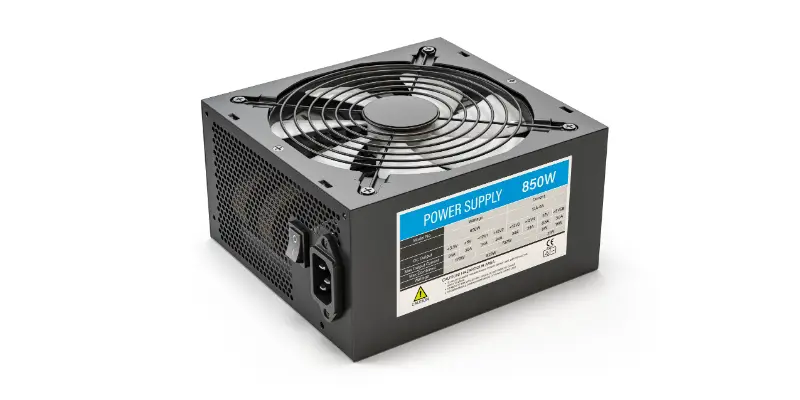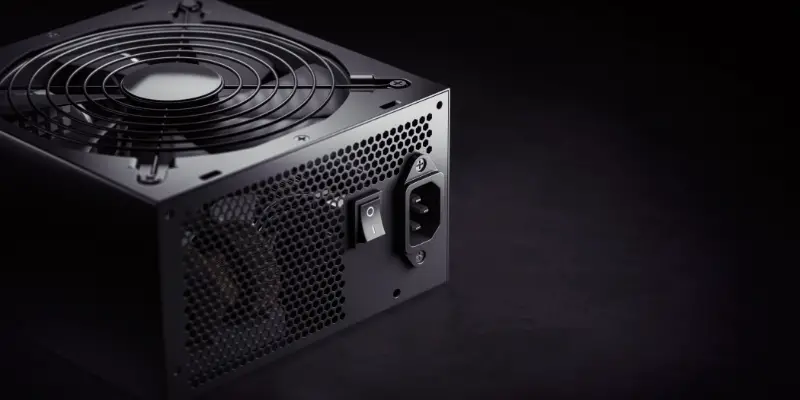Disclaimer: This post may contain affiliate links, meaning we get a small commission if you make a purchase through our links, at no cost to you. For more information, please visit our Disclaimer Page.
When you purchase a power supply unit (PSU), you’re making a long-term investment.
The lifespan of an advanced power supply unit is between 10 years and 11 years. If the PSU system is properly used, it should last up to 10 or 11 years. However, if not under the normal intended use, you can expect it to last for about 5 years.
Table of Contents
How Long Are PSUs Good For?
Before answering this question, let me start by talking about what PSUs are and how they function.
For those who don’t know, a power supply unit (PSU) is a type of system that helps to convert power for every component in a computer. Many people often say that PSUs are in charge of supplying the system with power. However, that’s not exactly what they do.
Instead, power supply units are the ones responsible for converting the alternating high voltage current (AC) into direct current (DC). However, that’s not the only thing that they do; they also tend to regulate the DC output voltage to smoother outcoming voltage, which is required for modern computing components. Since the PSUs can perform a couple of tasks, it means their lifespan will certainly depend on how they are utilized.
Furthermore, you need to understand that there are three different types of power supply units. The first one is the AT Power Supply – you can only find them in very old computer systems. The ATX Power Supply is another type of PSU technology. You can always find them on some PCs but they aren’t that common when compared to the ATX-2 Power Supply. This type of PSU is commonly in use today – you’ll find it on most modern computer systems.
Here’s how long PSUs are good for
That said, provided the PSU is in good condition and properly managed, you can expect them to last up to 10 or 11 years. For instance, according to a study published by the University of Sheffield, the lifespan of ATX PSU is expected to be around 100,000 hours. By that conversion, that’s roughly 11½ years.
Furthermore, the study also emphasizes that the lifespan will vary depending on the operation conditions of the hardware component. Below is a brief excerpt of what the study says about the lifespan of PSUs:
“…the lifespan of an Advanced Technology Extended computer power supply unit (ATX PSU) is expected to be around 100,000 hours (11 years) depend on the operation conditions, which means the ATX PSU in the majority of PCs is made redundant at least 5 years before the end of its life span.”
Although the study mentions 11 years, that’s only if you take great care of it. Expect your PSU to last at least 5 years. Read on to learn more about factors that can cause a PSU to fail.
Do PSUs degrade over time?
Now that you understand and know the lifespan of ATX PSUs, let’s proceed to the next burning question of this post – do PSUs degrade over time?
The answer to the question is that it depends on the quality of the PSU technology and exactly how you allow it to run. As you now know, the best ATX PSU can last up to about 11 years, depending on the working condition. If the quality of the PSU isn’t great, then you should expect it to degrade over time. Of course, that’ll surely also affect the lifespan, leaving the power supply unit with a reduced year to function.
Furthermore, you need to understand that tons of factors can affect the quality of PSUs, making them degrade over time.
According to experts, most PSUs tend to fail quickly because of cracked MLCCs. In case you don’t know, MLCCs, which stands for Multi-Layer Ceramic Capacitors, are the types of ceramic capacitors that you’ll find on modern electronics and computers. They are often added to computers for filtering purposes.
As earlier mentioned, the lifespan of PSUs tends to reduce because of cracked Multi-Layer Ceramic Capacitors. But what exactly causes the MLCCs to crack inside the computer?
Bad handling is the very first factor that causes cracks on MLCCs. However, this usually happens during the manufacturing process, when there is an improper Printed Circuit Board (PCB) stacking.
During the solder-wave process, when too much heat is applied, it can lead to the bending of the Printed Circuit Board. This could also lead to cracked MLCCs.
Apart from cracked MLCCs, other common factors that can affect the quality and lifespan of PSUs include:
- Cracked PCBs
- Improper soldering repairs on the printed circuit boards
- High current and voltage surge
So, the bottom line is, if any of the above-listed factors affect the quality of your PSU, it can cause the hardware component to degrade over a long time (about 5 years?).
Now, you understand why most experts will advise you to always change the power supply unit of your computer system after using it for 5 years.
Do PSUs Lose Power Over Time?
So, here’s another often asked question; can power supply units lose power over time?
As earlier mentioned, PSUs can degrade over time, depending on their qualities. Since that’s the case, it’s safe to say that they can always lose their power over time. While that’s the fact, it’s worth knowing that this can only occur over a long period – about 5 years or more. And even if it happens, the power loss will not be much.
How Often Should You Replace Your PSU?
Having gone through various social media platforms and forums, another common question that people ask is how often they should replace their power supply units. To answer this question, I’ll say it depends on a couple of factors, such as how you use your system and the type of power you’re converting with the PSU.
Corsair is one of the best PSU companies out there. By making use of the brand’s high-quality power supply unit, you can consider replacing the product every 5 to 8 years. Of course, that’s if you’re not using it for power activities, such as Bitcoin mining.
4 Signs That a PSU Needs to Be Replaced
As earlier mentioned, you can always consider replacing your PSU every 5 to 8 years. But here’s a question, is there any sign that you can get to know that it’s time to replace the power supply unit?
Yes, there are a couple of signs that’ll tell you it’s time to replace the PSU. Let’s have a quick look at some of them below:
Computer’s failure to start
If you’re trying to switch on your computer and it’s failing to start up, this might be a sign that you need to replace your PSU. In this case, you need to first check and understand how long you’ve been using the system. If you recently started using the PC or recently replaced the PSU, then the problem might be because of another thing, such as the motherboard issue.
Instability under load
Another sign that you can notice, to understand that it might be time to replace your PSU is when you keep experiencing random shutdown or restart of your PC. Often, this could occur when you’re using a high load, which the PSU is not capable of catering to at the time.
Unexpected video errors
If you keep experiencing unexpected video errors every time, it could be a result of a bad PSU. In this case, you need to replace the power supply unit with a new one.
Noise from power supply fan
Can you hear a sound (more of a grinding sound) from your power supply fan? If yes, there’s a higher chance that the best solution is to replace the PSU with a new one.
Conclusion
As you now know, many factors need to be put together to fully understand how long PSUs are good for.
Although the expected lifespan of the hardware components is between 10 to 11 years, the truth remains that many factors will affect how long they remain useful for your PC. That said, ensure you pay attention to the signs listed above and replace your PSU at the right time.


